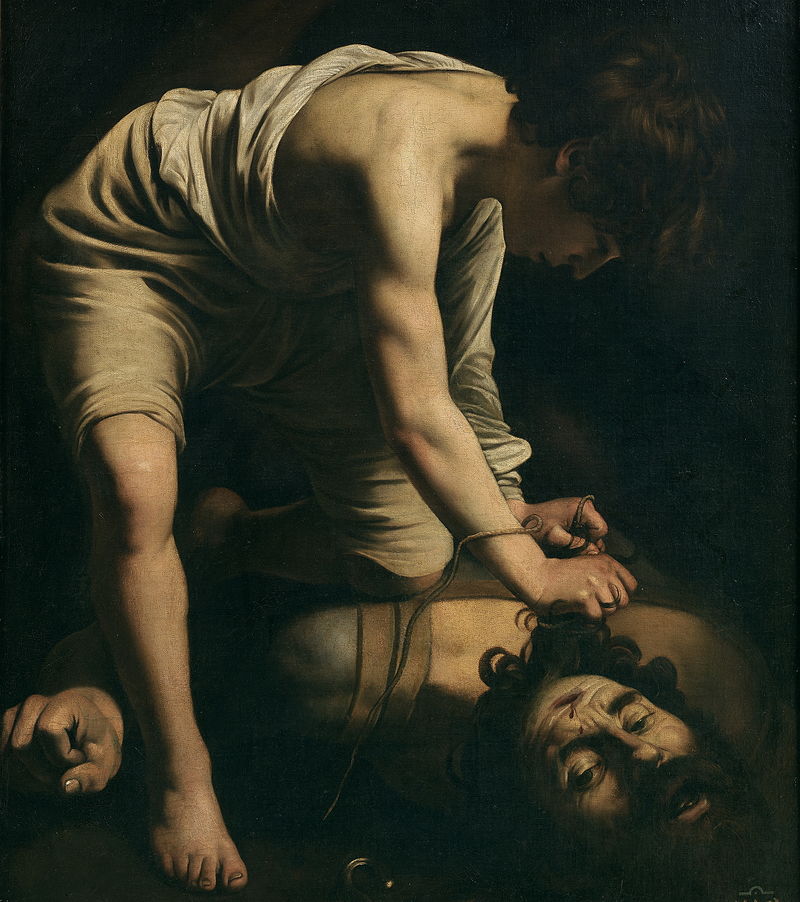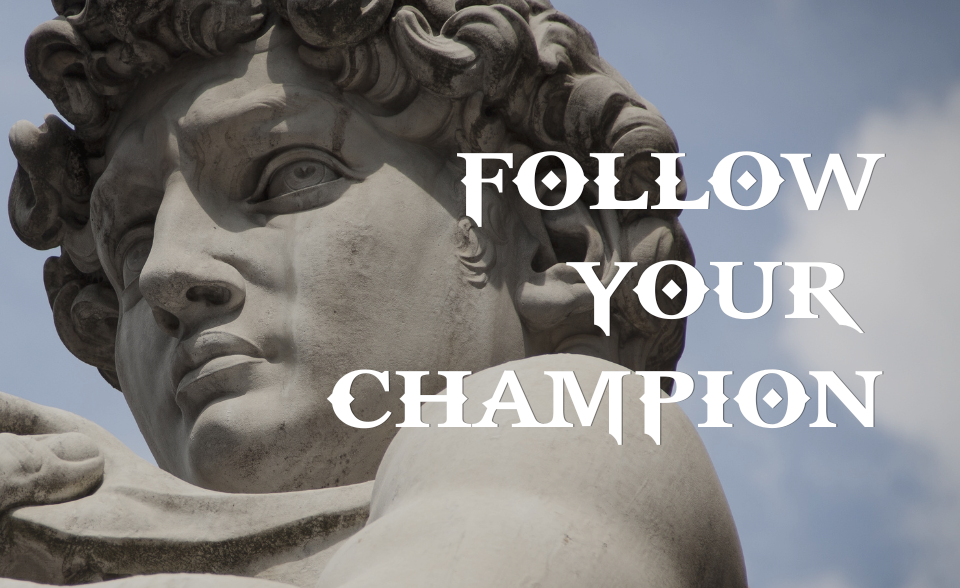The battle lines had been drawn, but the two armies were at a standstill. Israel and Judah gathered on the north side of the valley of Elah, and their long-time enemy, the Philistines, were arrayed to the south. For forty days, the Philistines taunted the armies of the living God, who showed up to battle but lacked the courage or the champion to fight for them.
The rules of the battle had been established. Each side was to choose a man to represent their army. Whoever survived the duel would be the victor, and the other side would be their servants. Israel had yet to find a volunteer, but the Philistines had an ace in their pocket: the nine-and-a-half-foot-tall Goliath. He was a man of war, and he was terrifying. Each day, he stomped to the front of the battle lines, covered in 130 pounds of bronze armor, swinging a fifteen-pound sword, and cursing the Israelites and their God.When the teenage shepherd, David, showed up to deliver fresh cheese and bread to his older brothers, he couldn’t believe his ears. How dare this uncircumcised Philistine defy the armies of the living God (1 Samuel 17:26)! How could his countrymen allow God’s name and reputation to be sullied in such a way? Did they not remember how often God had delivered his people? How could they stand by and let this brute carry on like this?
A sling and a stone
David told King Saul, “Let no man’s heart fail because of him. Your servant will go and fight with this Philistine” (1 Samuel 17:32). David had experienced God’s faithfulness in battle before. He fought off a bear and lion when they had carried off his lambs, and he knew the Lord would deliver this Philistine into his hands in the same way. He gathered a few stones, put them in his shepherd’s bag, and approached the giant.
David made his case before the hearing of both armies. This was not a battle about small versus great or courage versus fear; this was about God’s name, fame, and ability to save.
David said to the Philistine, “You come against me with sword and spear and javelin, but I come against you in the name of the Lord Almighty, the God of the armies of Israel, whom you have defied. This day the Lord will deliver you into my hands, and I’ll strike you down and cut off your head. This very day I will give the carcasses of the Philistine army to the birds and the wild animals, and the whole world will know that there is a God in Israel. All those gathered here will know that it is not by sword or spear that the Lord saves; for the battle is the Lord’s, and he will give all of you into our hands.” (1 Samuel 17:45-47).
David ran toward Goliath, put his hand in his bag, took a stone, and slung it at the giant. Like a slow-motion movie, both armies stood transfixed as the small stone flew through the air and landed squarely between Goliath’s eyes. The giant teetered and then fell down dead. David rushed over to the Philistine, used his own weapon against him, and cut off his head.
Then, seeing that their victory was secured, a great shout rose from the men of Israel and Judah, and they pursued and plundered their enemies.

David and Goliath by Caravaggio, 1599, Public Domain
Then, seeing that their victory was secured, a great shout rose up from the men of Israel and Judah, and they pursued and plundered their enemies.
Who’s the champion of your battles?
The story of David and Goliath has become synonymous with the story of the underdog. We love to root for the little guy who overcomes great odds to defeat his foes. So often, when it seems we’re at an unfair disadvantage, we consider ourselves David and our obstacles to be like Goliath. We’re exhorted to take up our stones of faith and sling them at whatever stands in our way. If only we could be more like David, our giants would fall, and we’d have more victories in this life!
While those lessons are well-intentioned, is that what we’re supposed to glean from this famous story? Are we to identify with David, or are we someone else entirely? Is it possible that instead of playing the role of the champion, we’re the cowardly army waiting in the wings for someone else to fight the battle for us?
Imputed victory
The story of David and Goliath is about David’s imputed (or transferred) victory in Israel. It was a winner-takes-all battle, which Jesus Christ, our Champion, did for us at the cross. He defeated our ultimate foe, Satan, and his victory was imputed to us. Romans 5:18 says, “Therefore, as one trespass led to condemnation for all men, so one act of righteousness leads to justification and life for all men.”
While the armies of the living God shrunk back in fear before David’s victory, there was a collective shout that went up after he cut off Goliath’s head. They had nothing against Goliath in their own strength, but because of their champion’s victory, they were emboldened to run into battle.
And just like David chopped off Goliath’s head, Jesus rendered a fatal blow to Satan’s head at the cross (Genesis 3:15). Our foe has been mortally wounded, but his head is still intact. So when does this final blow come?
Another battle and victory are coming
In Revelation 19, the final stages of the Tribulation are playing out on Earth. The marriage supper of the Lamb has taken place in heaven, and the saints follow their Champion, who is called Faithful and True, into battle.
This time, the saints won’t be the fearful and cowardly army shying away from the battlefield. Instead, we’ll ride triumphantly behind our Champion. While our Champion came the first time as an underdog of sorts, this time, there will be no mistaking that he is the King of Kings and Lord of Lords.
His robe will be dipped in the blood of his enemies, and he rules with an iron scepter. Unlike David’s battle, no stones are slung, or arrows are shot, only the sharp, penetrating words that proceed from the Son of David’s mouth. These are enough to destroy all his enemies, and like at the valley of Elah, the birds of the air gorge themselves on the flesh of his enemies (Revelation 19:11-21)
The battle belongs to the Lord
Before both armies, David confidently declared the battle belonged to the Lord. The same is true for the greatest battle and the most deadly Goliath we’ll ever face, which is sin. You could never defeat such an enemy, and so Jesus went to the cross, paid the penalty for your sin, and simultaneously crushed the serpent’s head. Although we live in his imputed victory, we follow him daily in battle against the world, the flesh, and the devil. We win some, and we lose some, but we know Satan is a defeated foe.
The question is, is Jesus your Champion, or are you looking for another? Don’t try to play the role of the champion; instead, find security in your placement behind your Champion, who is the King of kings and Lord of lords. His victory is yours; therefore, you are more than a conqueror through him who loved you.
The battle belongs to the Lord, so carry on, Christian soldier.
Cara
P.S. When David wrote Psalm 23, he might’ve been thinking about the dark valleys and shadows of death the Lord delivered him from, including delivering him from the Philistine’s hands. I invite you to consider your own Shepherd King in this free ebook, Paths of the Righteous. In it, we’ll walk through David’s Psalm and consider the stories of other saints that have gone before us.

5 Responses
So good and so true! I love viewing the story as us being Israel instead of David; it makes the story that much more amazing as it points to our eternal conquerer!
Thanks, Caitlyn! It’s a perspective shift, for sure, but a good one! 🙂
Yes, Jesus is our Champion against whatever foe comes against us.
Yes, and amen!